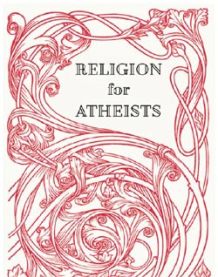 I was in no hurry to read this book - Religion for Atheists: A Non-believer’s Guide to the Uses of Religion
I was in no hurry to read this book - Religion for Atheists: A Non-believer’s Guide to the Uses of Religion
So, out of a sense of responsibility I purchased and read it.
My conclusion – a waste of money and time!
I don’t intend this to be a review of the book. For that I recommend reading Martin S Pribble’s thoughtful review (Religion For Atheists). As an aside, I followed Martin’s reading of this book via his Twitter comments. First time I have come across a Twitter book review! I think it sort of works – at least when the reader gets emotional about what he or she is reading.
Sufficient to say that de Botton sets up straw men – an idealised, perfect religion (mostly Christianity) and a deficient, sterile, secular society. His only objection to religion appears to be their supernatural stories. So his answer to the worlds’ problems is to ditch supernaturalism but adopt the remaining institutions, buildings, funding structures, social relationships, moral messages, music and art of religion (particularly Christianity). As is! Artificially.
My atheist friend often comments on the need in our secular society to develop institutions which provide for the social needs of people. Their desire for community and charity. So I can see why she was, at least initially, attracted to this book. It’s just that I can’t see how de Botton’s utopia (religion with all its trappings except its gods) provides this, or is even possible.
Personally I agree that modern society needs to provide more in the way of institutions, ceremony and even buildings which appeal to our desire for community and significance. But that is not unique to modern society – it has always been the case – especially as the old institutions often did not fulfil these promises, or were even quite evil.
The point is that the most appropriate ceremonies, institutions and culture for these purposes are the ones that are built by the existing society, not artificially transplanted into it. And we are building such institutions, ceremonies, etc., in our modern, pluralist, secular society.
Religion needs secularism – and can learn from it
Why should we artificially transplant something from a religion (after removing its supernatural content) when we can do better? Consider modern ceremonies like weddings and funerals in this country. They have become a lot more secular – even where they are performed in a Church. We seem to have welcomed with open arms the secular concept of remembering and celebrating the life of a deceased person in our funerals. Friends and family give their stories and feelings. New Zealand funerals today are far more satisfying than those in the old days which simply had the religious purpose of sending the person of into the “afterlife.”
The church has noticed and adopted many of the features of secular funerals and other ceremonies. Incorporated them into their own ceremonies.
There are many other examples. The point is that – yes, we do need more and better institutions and ceremonies which contribute to our human need for community and friendship. We do need more buildings, art and ethical commentary appealing to those needs. It’s a matter of more of what we are doing well, not artificially transplanting from old and moribund institutions and ideologies. And its a matter of creating these new institutions and culture in a way that is inclusive – not the exclusiveness “them vs us” of the religious approaches.
So, my recommendation is that you should give this book a miss, unless you feel a responsibility to read it like I did. At least I will now be able to discuss the book and my reactions intelligently when I next see my atheist friend.
